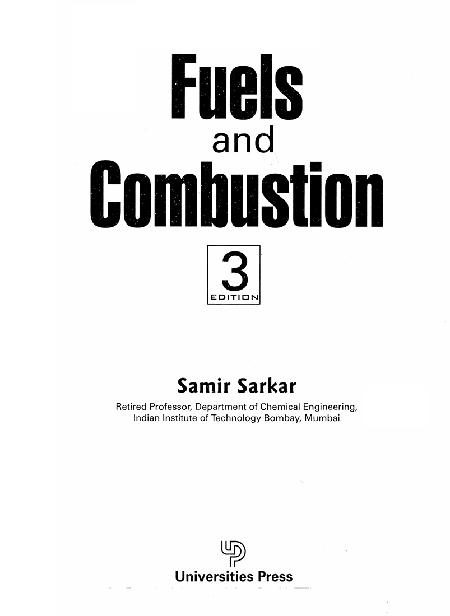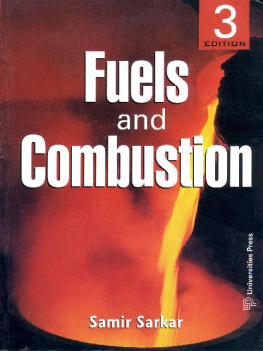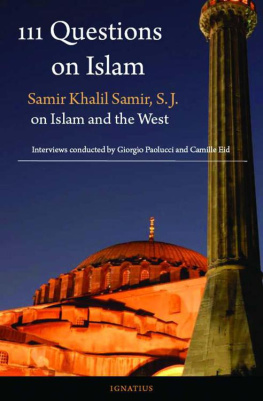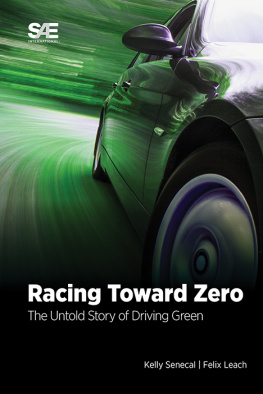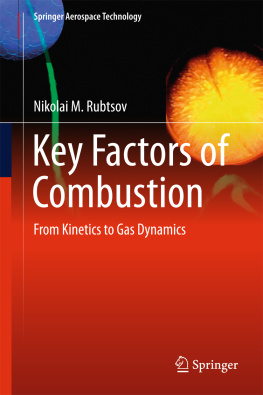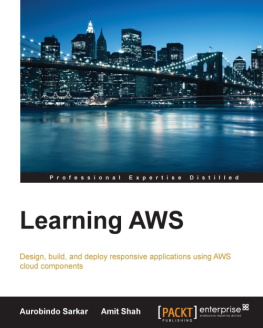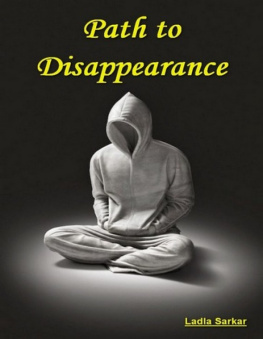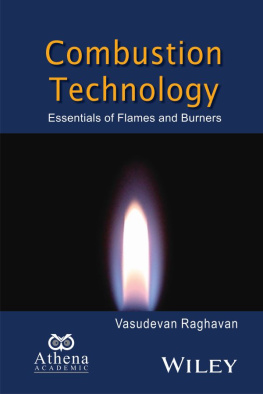Fuels and Combustion
Universities Press (India) Private Limited
Registered Office
3-6-747/1/A & 3-6-754/1, Himayatnagar,
Hyderabad 500 029 Telangana, India
E-mail: www.universitiespress.com
Distributed by
Orient Blackswan Private Limited
Registered Office
3-6-752, Himayatnagar, Hyderabad 500 029 Telangana, India
Other Offices
Bengaluru / Chennai / Guwahati / Hyderabad / Kolkata / Mumbai / New Delhi / Noida / Patna / Visakhapatnam
Universities Press (India) Private Limited 2009
First Published by Orient Blackswan Private Limited 1974
Second edition 1990
Reprint 1994, 1996, 1998. 2001, 2003, 2005, 2008
Third edition 2009
Reprinted 2010, 2012, 2016
e-edition: First Published 2022
eISBN: 978 93 89211 38 2
All rights reserved. No part of this book may be reproduced or utilized in any form, or by any means, electronic or mechanical, including Photocopying, recording, or by any Information storage and retrieval System. Without permission in writing from the publisher.
Published by
Universities Press (India) Private Limited
3-6-747/1/A & 3-6-754/1, Himayatnagar,
Hyderabad 500 029 Telangana, India.
Preface
Third Edition
The first edition of the book was published in 1974. It was so well accepted by students and professional engineers that it necessitated the publication of an improved edition within a few years. Therefore the second edition of the book was published in 1990.
I retired from the Indian Institute of Technology, Bombay in December 1993. At the end of 2007 I was asked by Universities Press, an associate of Orient Longman Private Limited (now renamed Orient Blackswan Private Limited) to write the third edition of the book. Being physically incapacitated I initially declined. However, the persuasive efforts of Mr Madhu Reddy, who met me in Kolkata, emboldened me to undertake the revision. The first chapter has once again been revised to include the most recent data on global reserves and consumption of fuels. The data in other chapters have also been updated wherever available. The layout of the book has been redesigned to give visibility to all sub-topics and improve readability.
In the process of compilation of the third edition I acknowledge the help received from the library of Development Consultants Private Limited (DCPL), Kolkata, Coal India Limited and my son Prof. Sutanu Sarkar, for his compilation of recent international data about the conversion of coal to oil throughout the world and other fuel related information.
I pray that this edition should be useful to students and teachers in India and abroad.
Preface
Second Edition
Primarily meant for students as a textbook, Fuels and Combustion has been well accepted by professional engineers as well.
The book was out of print for a long time. Repeated requests have been received for bringing out its second edition.
The first edition has been critically read several times. The bulk of the text has remained topical after fourteen years of its publication. However, chapter one has been thoroughly revised. Some of the topics in other chapters have been updated. The numerical problems in chapter six and seven have been augmented. All the problems for practising have been provided with numerical answers.
The statistical data needed close scrutiny. The addition of newer data has been possible by the help received from the staff of the Central Fuel Research Institute, Dhanbad, and the Tata Energy Research Institute, New Delhi. I am indeed thankful to them.
Acknowledgement is due to the Curriculum Development Centre of the Indian Institute of Technology, Bombay, for financial support in the preparation of the manuscript.
December 1988
Samir Sarkar
Department of Chemical Engineering
Indian Institute of Technology, Bombay
Preface
First Edition
Fuels and Combustion forms an integral part of the undergraduate degree courses in Chemical, Mechanical, Metallurgical and Aeronautical Engineering. While in the vast majority of courses the subject retains a distinct identity, there are instances when it is treated as a minor adjunct to other topics. Apparently this is the result of hasty distribution of available hours, where the first victim is the students understanding of the subject, leading to difficulties in the application of the knowledge in later years. Since there can be no two opinions on the basic need of the subject for the engineering courses concerned, a definite place has to be found for it in the academic curriculum.
The subject has two aspects, namely, Fuels and Combustion. Their relative importance in a given course is a matter of judgement. However, one should bear in mind that a good treatment of combustion can only follow a sound understanding of different fuels. On the other hand a rigid balance between the different aspects of the subject cannot constitute a set pattern for all the courses. Enough flexibility in this regard should be available to the teacher and the taught. To a chemical engineer, fuels not only supply energy but also provide basic raw materials for a host of vital industries. It is, therefore, understandable why much greater stress should be laid on the processing of fuels for the benefit of chemical engineering students as compared to those of other branches of engineering. On the contrary, an Aeronautical Engineering student may not require more than a cursory treatment of solid fuels, and may prefer to raise the combustion content of the subject.
I have planned the present textbook in such a way that all those requiring a course on Fuels and Combustion will find the required material in it. In consonance with the modern methodology of teaching I have laid stress on the systematic development of the subject. The maximum attention has been given to elucidating the fundamental principles, while the analytic approach has been exploited to the fullest possible extent. Indian raw materials and Indian practices have been given due coverage. Numerical problems have been worked out in many sections of the book and additional problems have been furnished for further practices. Furnaces and Boilers has been intentionally excluded from the present textbook. A mere descriptive treatment of this subject is considered uninteresting and undesirable for the engineering students. In fact Furnace Design has received a separate identity in the curriculum of some courses, even at the undergraduate level. This requires a separate textbook on its own.
In preparing the book I have received ample encouragement and support both from the Director of the Indian Institute of Technology, Bombay, and from the Head of the Department of Chemical Engineering, and I am thankful to them. I have benefited from innumerable books and articles and also by discussions with many teachers and students. It will not be fair on my part to single them out. However I must acknowledge the assistance received from TB Ray, J Eqbal and N Murugesan in the various stages of the preparation of the book.
I have derived great pleasure in writing this book. If the students for whom it is primarily meant find it useful, my efforts will have been more than rewarded. Year after year I have been facing the questions of my students on the availability of a suitable textbook. My colleagues have also had a similar experience. I have myself attempted to provide an answer to this question. Any suggestions for the improvement of this work will be gratefully welcomed and duly acknowledged.
